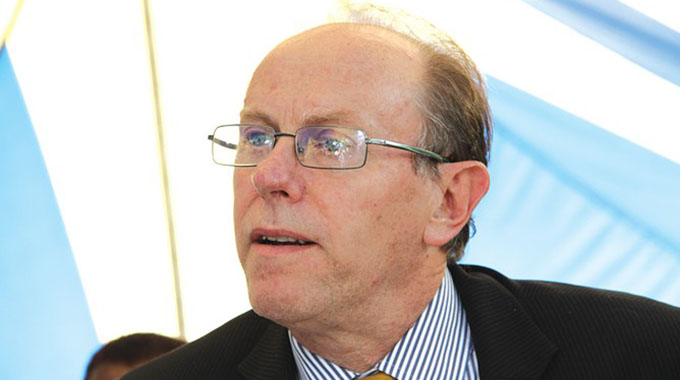Vendors: Putting reason ahead of common sense

Elliot Ziwira Senior Reporter
If there is anything that has eluded reason for some time, it is the thorny issue of vending in the central business districts of major cities and towns in Zimbabwe, particularly in Harare, where running battles between the police and vendors have always been the order of the day.
This comes as Government, through the Ministry of Health and Child Care, has given the Harare City Council a seven-day ultimatum to deal decisively with vendors trading at non-designated areas, thus exacerbating the outbreak and spread of cholera.
Between November 9 and November 15, at least 1 259 new suspected cholera cases were reported, as compared to 437 in the previous week, with Harare accounting for 323, Chitungwiza (206) and Buhera (68). Other new cases were reported in Goromonzi, Mudzi, Mutasa and Mutoko districts.
“So, we have had a conversation with the Municipality of Harare authorities to take remedial measures, failure of which we will have to move in as Government, and definitely we have to remove these illegal vendors, because they will cost us lives,” Health and Child Care Minister Dr Douglas Mombeshora said on Tuesday.
Common sense tells us that it is not proper to rob one of the rights to feed one’s family in any manner that one deems necessary, especially when other avenues of bringing bread and butter to the table seem to be closed, blocked or non-existent.
As a natural intuition, common sense teaches us that the only way out of a situation is to counter it either by responding in a similar way, or a more robust way; or in some cases, by negating the existence of such a situation.
Common sense-based judgments are usually clouded in subjectivity, for there is no room to let that which we do not agree with to prevail.
Common sense pre-supposes that there are limited options out there for most citizens.
That families need to be looked after is true. Indeed, it is every citizen’s constitutional right to be allowed to bring grub to the table for his/her family.
But hold on for a while, fellow countryman and kinsman! Reason teaches us that whatever we may consider common has its own limitations, especially when read in the broader sense where individual rights cannot be separated from collective rights.
The individual does not exist in a vacuum, neither does he/she exist above moral, social and legal obligation.
Whatever rights an individual may attest to as being constitutionally binding, should not impinge on others’ rights.
As has been alluded earlier, vending is a way of life to some among us, so is operating a business, and just being able to be part of the bread-winning bandwagon, which is not necessarily vending-bound.
It is not like vendors are regarded as a menace, albeit a necessary one, but they need to operate within a regulatory framework that considers the rights of other citizens.
Yes, cholera is real, for it has claimed some of our own (May their souls rest in peace!), and put scores of others under the weather or strain. However, the issue of vendors in the central business district should go beyond the outbreak.
Hygiene and sanitation are not once off phenomena; they are real issues, central to the well-being of citizens, who for long have been crying out for local authorities to deliver them from the smelly alleys, thoroughfares and backyards they have to endure in their quests to deliver bread to their families’ tables.
Opposition-led councils have been found wanting in that regard owing to poor service delivery.
Not that they should take the blame alone, but vendors have contributed to the loss of glitter of the once Sunshine City, through wanton disregard of rules of cleanliness and tolerance.
They have overnight become street owners, nay shop owners, with rights to all “open” spaces even those in front of legally operating shops as well as roads.
Roads in the CBD have become virtually impassable, with hordes of vendors setting up shop willy-nilly, with seemingly no one giving a hoot about the inconvenience they cause to motorists and other law-abiding citizens.
Some of them have become so daring that they set up braai stands and mobile kitchens all-over the place, with neither clean water nor toilets in sight.
This is why the latest move by the Government to take the city fathers to task, coming on the heels of the activation of the Civil Protection Unit Act in Harare, is all the more crucial, not only in curbing cholera, but ensuring long-term service delivery and a return to sanity, too.
With vendors off the streets walking or driving along would become a pleasure again.
Shop owners, who have always cried foul to the local authority for making them abide by operating regulations and licensing, yet turning a blind eye to their non-compliant rivals lying in vigil on their doorsteps, would smile all the way to the bank again.
Now that the die is cast, as Government is ready to move in should the City of Harare fail to take corrective measures within a week, authorities can leverage on the wave and put sustainable systems in place to ensure that the issue of vendors is dealt with once and for all.
The merry-go-round should, indeed, be brought to a halt.
There are spaces available to vendors with ablution facilities, which they should take up, instead of them appealing to the common sense of citizens for them to be allowed to trade trivial wares in the CBD.
Vending is not new, neither is it peculiar to Zimbabwe, therefore, the opposition riding on it for political grandstanding, smacks of hypocrisy.
Whatever brought them to the streets in the first place is neither here nor there; what should worry well-intentioned citizens or political players and their sympathisers is how they should be kept off the pavements for the common good.
Other vices linked to vending can easily be curtailed, for it is not uncommon for hoodlums to take advantage of the chaos usually associated with the perennial running battles between law enforcers and vendors, which leaves innocent Zimbabweans counting loses.
It is difficult to navigate spaces where common linkages are absent, hence, authorities, vendors and citizens at large should find each other with the understanding that the sunshine that we aspire for comes after a storm, and the tempests that come our way require combined effort to weather.
The filthy streets that have become eyesores obstructing our vision of a golden future time can only be cleansed, cleaned and gleaned through change of mindsets.
Citizens occupy a crucial role in that paradigm shift.
Littering, relieving oneself in alleys, on walls or along the streets should not only attract stiff penalties, but should be self-censoring, and, therefore, self-abashing.
Indeed, President Mnangagwa is always on point as he emphasises that there should never be compromise on service delivery and restoration of order for the greater good to be the ultimate winner.
The little habits that we allow to go on unchecked have a way of destroying an entire nation, and reducing citizens to metaphorical and literal pauperism, where common sense becomes an elixir out of a dungeon, real or imagined.







Comments